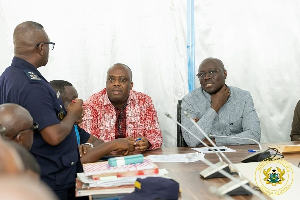A report on hand washing by Destina Samani on private partnership for hand washing practices in Ghana, the Global Public-Private Partnership to Promote Hand washing with Soap, reports that its first phase has been a great success. The report raises very serious concerns
The report also highlights that; this initiative will enter its second phase. Why has our Public Health Directorate not perhaps picked up on this issue before though? How should we wait yet again for someone else to inform us what exactly we ought to be doing?
Nevertheless, this new initiative is using three routes to bring the handwashing with soap message to target audiences including mothers and children; mass media, a district level programme using government channels and direct consumer contact programmes.
The processes involved in this programme could have been easily been adopted by the Public health promotional campaigns. As our key members of our society particularly market women, mothers, food handlers, school children are the target audience. Instead of our media hammering hygiene issues on our TV and radios foreign films are rather imported and other drama programmes and shown to this specific target audience. Why should we sit to be told off in a tactful way in programmes such as the water aid programmes? The programme did their research and indeed identified our weak points. This is the lack hand washing basins in our public toilets, to encourage good hygiene in our chop bars, shops, schools and public areas etc.
We accept foreign organisations to take up these initiatives, which is excellent, but exposes that we do not perhaps think of these crucial issues which enhances good living conditions enough ourselves. Is our Public Health Directorate proactive with initiatives that would enhance the health of our nation?
Phase One successes
The report pointed out that an evaluation of the first six months of the programme, which was undertaken in August 2005, reported the following findings: - the data showed significant increases in the rates of handwashing with soap, with 88.7 percent of mothers washing their hands after visiting the toilet, 55.2 percent washing before eating, 25.2 percent before feeding babies and 26.2 percent after eating. These rates showed marked improvements over the baseline rates. It further pointed out that, handwashing with soap rates for school children have also shown improvements with 87.4 percent washing their hands with soap at home, 51.6 percent washing with soap at school, 88.9 percent of children washing after the toilet and 76.2 percent washing before eating.
All these initiatives are excellent, however my argument is that, why should the Public Health Directorate wait for Ghanaians to be told to do this simple exercise?
Phase two The phase two aspect of the programme is also brilliant. As it seeks to build on the gains of phase one of the campaign. Some of the campaign strategies include. ? Using mass media to provide a visible and credible campaign ? Formalising and strengthening the district level and schools component of the initiative ? Direct consumer contact events using mobile cinema in media dark communities
The report stated that this phase would focus on carrying out innovative interpersonal communication programmes at community and individual levels. Again, I asked why do we have to wait to be told of our poor hygiene practices. I know our Public Health Directorate might be busy tackling malaria, HIV/Aids which is excellent as the same that one is not convinced that, this basic grey area have perhaps been missed out in their strategic planning of health targets.
Ghana Public Health Directorate must be feisty in tackling issues that they promote in order to reduce the unnecessary death among our children and adults. This water aid programme is targeting areas we take for granted assuming as ever that, the general public automatically wash their hands after any given task including visiting ordinary public toilets. I have nothing but praises for such a programme. It is amazing to see the various strategies they are using for example, the use of the mobile cinemas. This certainly aims to ensure that people are entertained while they learn and will be used in combination with participatory approaches that target audience are familiar with such as songs, dance drama, story-telling and so on.
The programme is targeting core areas, that is, our schools and pointed out that their ultimate aim of the schools' component is to entrench hygiene education in basic schools and ultimately institutionalise hand washing programmes in about 50 percent of primary schools in Ghana. These are issues that I feel perhaps should be part of all schools package of care to students. Why should someone else have to Ghana to spell out these issues, that we are failing our children and the nation with even basic hygiene? Is this not an insult to the Public Health Directorate?
Many of us are fully aware of how the Minister of Health is working tirelessly to enable Ghanaians to enjoy good health through the new NHIS and other initiatives. However, the Minister can not do everything. Surely, such a significant area yet basic should have been the responsibility of the Public Health Directorate to come out with initiatives such as what the Water Aid programme is currently engaged in.
It is a joy to read that the programme is also targeting mothers and will target mothers at life-changing events such as at antenatal and post-natal clinics and at child welfare clinics. The report also mentioned that the programme would provide each mother with a bounty pack card of soap and a mini-poster on hand washing with soap. Mothers will also be targeted at other social places including at work and at places of worship.
How could Ghanaians who regard ourselves as ?civilised nation? the first to be independent in Africa and yet failing to address areas of grave concerns such as of hand washing principles. The report goes on to say that, the hand washing with soap campaign appears to have made an impact on almost all Ghanaians. Really only demonstrate that handwashing was not generally practiced in Ghana as one would have liked to think. I have nothing more to say but to give praise to Water Aid and their programmes. At the same time one does acknowledge the drawbacks they are facing, that is, to maintain visibility, promote behaviour change and promote the hand washing with soap habit. All stakeholders need to keep reminding people to always wash their hands with soap, particularly at critical times.
Who are the stakeholders they seem to be mentioning here? Would it be pointing to the Public Health Department, the Educational Directorate, Ministry of Health, and the general public? Let us stop and think about these basic issues. Are we up to stretch in terms of basic hygiene? Any answers? Let us face true facts of lack of hand washing rituals within our society.
There is lack of hand washing practices at funerals, churches, schools, chop bars; public toilets have no hand washing basins. Who then are we benchmarking against? Could it be the US, U.K., Scandinavian countries or the ?Zongo?s of Ghana? This is no laughing matter!
Another area of grave concerns is fellow Ghanians when one is driving in Ghana one could easily spot men and women urinating in the open and then going back to do their daily shores business whether shaking hands with others, nursing children or even handling cooked foods.
Where is sense of basic hygiene gone out the window in my motherland. Would it be a good idea to daily bombard our radio stations and TV to promote hand washing as a necessity?.
On the other hand, a campaign is futile if you do not have the facilities to practice what is preached. Clean water, soap, and of course, hygienic means to dry your hands need to be available not just in peoples homes, but in all places of work and all public toilets. Therefore if Ghana wants to promote good basic hygiene surely all schools in must be provided with sutiable faciltiaties as recommended by the water aids to neure the effectiveness of their programmes. We should also think of an efficient way of the drying aspect of hand washing as this would be the biggest problem we would face.
Whose responsibilities is it then to ensure the implementation of what the Water Aids programme have identified as the drawbacks in to a total compliance of hand washing practices throughout Ghana.















